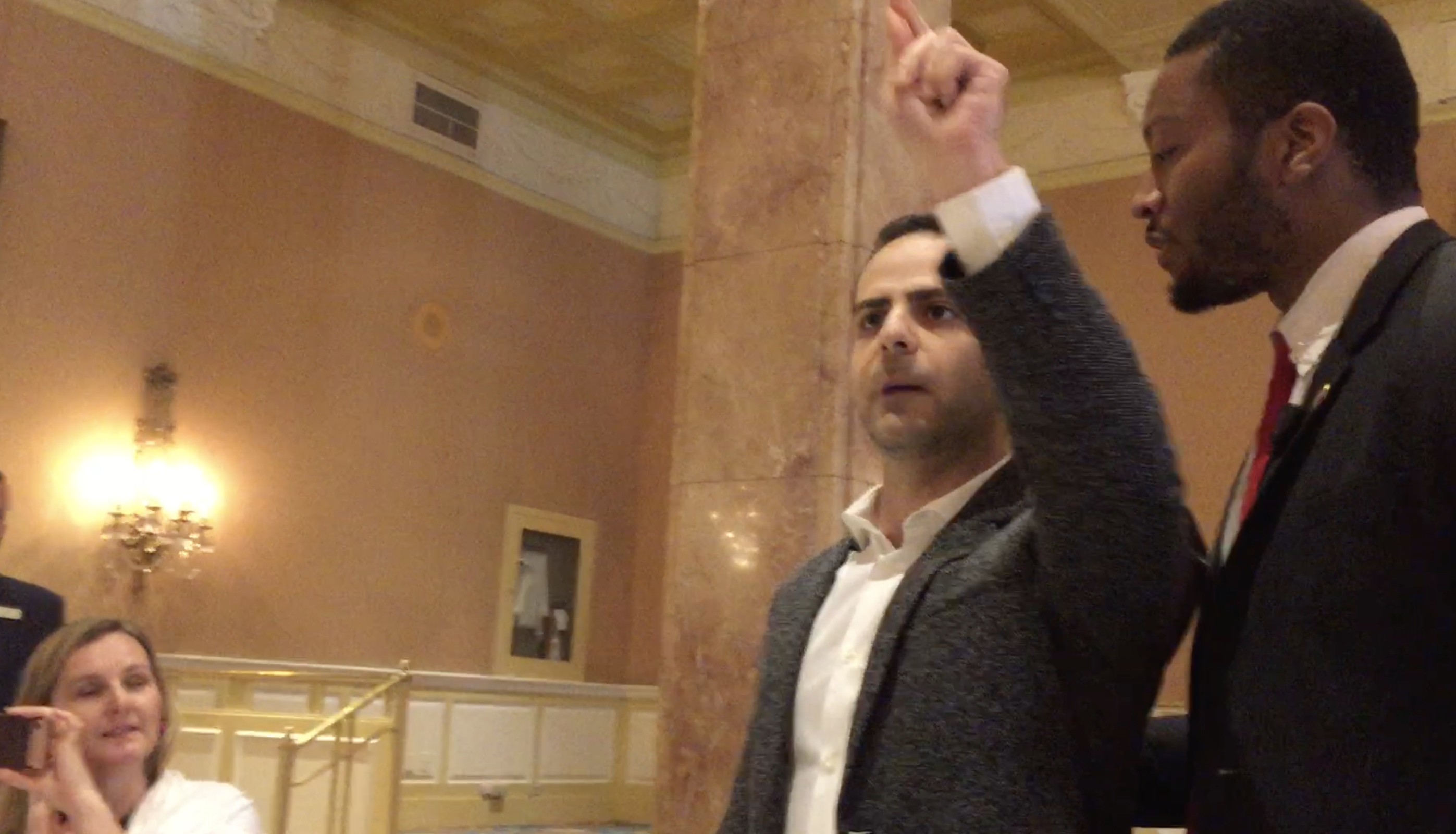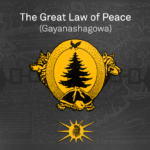
Palestinian-Canadian human rights activist Hammam Farah interrupts a speech by Israel’s Economy Minister, Eli Cohen, at a Bay Street luncheon held in May 2018.
There is a moment in Henry Kissinger’s memoirs — do not buy the book — when Nixon and Kissinger are looking out at tens of thousands of anti-war protesters who have surrounded the White House. Nixon had placed empty city buses in front of the White House to keep the protesters back. He worried out loud that the crowd would break through the barricades and get him and Kissinger. And that is exactly where we want people in power to be. This is why, although he was not a liberal, Nixon was our last liberal president. He was scared of movements. And if we cannot make the elites scared of us we will fail.
Christopher Hedges, November 2016
Recently, human rights advocate Peter Larson published on his website, Canada Talks Israel Palestine, a blog post addressing accusations from Prime Minister Trudeau and other Canadian party leaders that I had directed a ‘vile anti-Semitic smear’ at two Members of Canada’s Parliament.
The MPs in question are Liberals Michael Levitt and Anthony Housefather. They are both members of the Executive Committee of the Canada-Israel Interparliamentary Group. Levitt is the Chair of that Group. Levitt and Housefather also happen to be Jewish.
My alleged ‘anti-Semitic smear’ was a tweet in which I wrote:
Apparently, Liberal MPs Anthony Housefather and Michael Levitt are more devoted to apartheid Israel than to their own prime minister and colleagues in the Liberal caucus.
After Trudeau and other party leaders falsely accused me of anti-Semitism, Peter reviewed over 100 blog posts on my website going back to January 2017. He then wrote[1] that:
[Lascaris] is a very vocal advocate of BDS, the movement to boycott Israel over its treatment of the Palestinians, and very critical of both Elizabeth May and Jagmeet Singh for not endorsing it. But I could find no whiff of any animus against Jews…
While his tweet may have been insensitive, any intimation that Lascaris himself is anti-Semitic appears to be ill informed and perhaps even politically motivated. It would appear that a number of political leaders who have been sharply criticized by Lascaris in the past are not willing to come to his defense in the face of Trudeau’s attack.
I have already explained the context of my tweet and the reasons for which I categorically reject the Prime Minister’s accusation of anti-Semitism. My purpose in writing this post is not to add to that explanation, but rather, to respond to other criticisms Peter articulated in his post.
In addition to stating that my tweet “may have been insensitive”, Peter wrote that “some would characterize [Lascaris’] style as ‘brash’ or ‘in your face.’” He continued:
The fact that Housefather and Levitt are Jewish make the charge a sensitive one, as historically anti-Semites have used the allegation of “disloyalty” as a way to attack and undermine Jews. Lascaris should have known this. His ad hominem attack on their motives and loyalties may have been heavy handed, and injudicious…
This incident reinforces CTIP’s contention that activists hoping to move Canadian policy towards human rights for Palestinians need to be extremely careful in their choice of actions and words. In particular, we need to recognize how easily the fears of Canadian Jews (and indeed of all Canadians) can be exploited. While some Canadians might feel that those Jewish fears and Jewish sensitivities have been exaggerated, and indeed even manipulated, they are real nonetheless, and need to be taken into consideration.
CTIP’s motto is “raise the issue while lowering the temperature”. Harsh words only serve to heighten the sense of insecurity and reduce the possibility of reasonable dialogue.
The Big Picture
Before I delve into the specifics of Peter’s critique, let us take stock of the accomplishments of Canada’s Palestinian solidarity movement.
Broadly speaking, the ultimate goal of our movement should be to ensure that the Palestinian people are accorded equal rights. Equality for Palestinians means that Israel’s de jure and de facto discrimination against Palestinians is ended, and that Palestinian refugees be allowed to return to their homeland or be adequately compensated for their expulsion.
I suspect that few activists in Canada’s Palestinian solidarity movement would disagree with these basic propositions.
The reality, however, is that Canadians cannot directly influence the conduct of Israel’s government because, unless we are also citizens of Israel, we do not have the right to vote in Israeli elections or to contribute financially to the campaigns of our preferred Israeli political candidates. Without Israeli citizenship, we can influence the conduct of Israel’s government only by indirect means, such as boycotts against those who profit from violations of Palestinian human rights, or by pressuring our own government to impose sanctions on the state of Israel and its leaders.
When it comes to the question of boycotts and sanctions, it ought by now to be abundantly clear that mere words of condemnation will not fundamentally alter the conduct of Israel’s government. Since 1948, the United Nations General Assembly and Security Council have adopted hundreds of resolutions concerning Israel and Palestine, a great many of which unequivocally condemn Israel’s human rights violations. Quite apart from that, national, regional and municipal governments from around the world and numerous human rights organizations have denounced Israel’s crimes on countless occasions.
What has this mountain of human rights rhetoric achieved?
Today, Israel’s settlements — a clear war crime under the Rome Statute of the International Criminal Court — are more extensive than ever. There is no peace process that might realistically lead to the dismantling of the settlements or to the establishment of a truly sovereign and viable Palestinian state. Humanitarian conditions in Gaza, home to about 2 million Palestinians (about one-half of whom are children), are worse than ever. Gaza’s water supply is almost entirely contaminated. Its unemployment rate stands at over 50%, the highest in the world. The Trump administration has just cancelled U.S. funding of UNWRA, a cruel measure that threatens to plunge hundreds of thousands of Palestinians into starvation.
In December 2016, the U.N. Security Council issued its latest condemnation of Israel, Resolution 2334. That resolution was adopted unanimously, with the Obama administration abstaining.
How did Israel react?
Since the adoption of Resolution 2334, Israel has continued to expand its settlements and has purported to ‘legalize’ settlements that were previously unlawful under even under Israeli law. It has adopted a ‘law of the nation’ that effectively formalizes the existence of its apartheid regime. On Gaza’s border, its snipers have murdered over 200 unarmed Palestinians, including children, medics and journalists. Thousands of other unarmed Palestinians have been wounded with live fire, and many of those wounded are now permanently disabled.
If anything, therefore, Israel’s appalling treatment of Palestinians has become even worse since the adoption of Resolution 2334.
Meanwhile, and perversely, the attitude of Canada’s government has become even more pro-Israel. Housefather recently boasted in the Canadian Jewish News that Trudeau’s government has voted against U.N. resolutions condemning Israel more frequently than even the government of the fanatically pro-Israel Stephen Harper. According to Housefather, Trudeau’s government has voted against 87% of such resolutions, whereas Harper’s voted against 62% and the government of former Liberal Prime Minister Jean Chretien voted against a mere 3%. Within the past few days, Trudeau’s government joined with Israel, the Trump administration and a few tiny island states to oppose UN resolutions condemning Israel’s human rights abuses. As occurs every year, those resolutions received massive support from the General Assembly.
The icing on Trudeau’s pro-apartheid cake is that, only six months after an Israeli sniper shot Canadian doctor Tarek Loubani– a war crime for which no Israeli soldier has been held accountable – the Trudeau government declared that Canada’s support for Israel remains “ironclad” and that his government seeks to be an “asset for Israel” on the U.N. Security Council.
Let Us Be Frank with Ourselves About Our Movement
What lesson ought we to draw from the horrible facts on the ground?
To my mind, the lesson is unambiguous: despite the admirable efforts of so many wonderful human rights activists across Canada, we are further than ever from our goal of causing Canada’s government to impose sanctions on Israel, and to do so within the time frame necessary to avoid a humanitarian catastrophe in Gaza.
It is of course true that the Palestinian solidarity movement confronts formidable obstacles in the West: Western leaders are far less concerned with human rights than they profess to be, and are far more preoccupied than they care to admit with Western hegemony and their own crass, political ambitions.
But our collective failure to ensure that Canada’s government treats Palestinians justly is not entirely due to factors beyond our control. To some extent, it is also due to our own timidity.
A case in point is a debate within our movement about whether we should label Israel as an apartheid regime. For someone, like me, who has been to the Palestinian city of Hebron, that entire debate seems surreal because, as Gideon Levy has stated, “there is no other place where you can see the Israeli policy, the Israeli apartheid in the West Bank, in such crystal clear colors.” Last year, Professors Virgina Tilley and Richard Falk issued a landmark report in which they concluded that the evidence Israel is committing the crime of apartheid is “overwhelming”. (Professor Falk, who happens to be Jewish, is one of the world’s leading scholars in international law.) That Israel is committing the crime of apartheid – the second worst crime against humanity after genocide – has become so obvious that even a few leading figures of Israel’s establishment have begun to acknowledge that Israel is an apartheid state.
Despite the brazenness with which Israel is committing the crime of apartheid, I have been told by some members of our movement that we should refrain from labelling Israel as such because the public might then perceive us to be extremist and will be less likely to regard us as credible voices in the discussion about Israel and Palestine. But, if we refrain from talking about Israeli apartheid, how will Israeli apartheid ever become part of the mainstream discourse in our country? By succumbing to the fear of being labelled as extremist, we increase the risk that the broader Canadian public will never understand the true gravity of Israel’s crimes.
It is, moreover, incumbent upon us to ask ourselves what occupied Palestinians must think about this issue. Would they want us to refrain from calling a duck a duck? If you had spent your entire life living under a savage apartheid regime, how would you feel if the citizens of the states that were most complicit in your suffering refrained from calling your oppressor by its true name?
The Way Forward: It is Time to Raise the Temperature
In my respectful view, we have only one option: we must escalate our resistance to Israel’s racist policies and practices.
By “escalation”, I mean vigorous and relentless, but peaceful, disobedience.
Moreover, I believe that our civil disobedience must be directed primarily at Canada’s pro-Israel lobby, including those of our elected officials who often behave as little more than spokespersons for Israel’s government.
Why must we focus upon the pro-Israel lobby? Because that lobby is engaged in a highly sophisticated scheme – a scheme that might well be supported covertly by Israel’s Ministry of Strategic Affairs — to mislead Canadians about the true nature of Israel. The pro-Israel lobby has invested massively in misleading Canadians because it understands perfectly well that, if Canadians grasped the true extent and nature of Israel’s crimes, they would never tolerate the Canadian government’s pro-Israel policies and practices.
Exposing the hypocrisy and deceit of Israel’s advocates in Canada is therefore indispensable. Unless we solidarity activists effectively discredit the purveyors of hasbara, our movement is unlikely to generate sufficient public pressure to cause Canada’s government to impose sanctions on Israel. And without sanctions, there will be no justice for Palestinians.
That is why, in August of this year, I helped organize a pro-CUPW rally after B’nai Brith Canada attacked CUPW for supporting Palestinians rights. That is why, in July of this year, I participated in a disruption of Hillel Neuer’s acceptance speech at McGill University’s convocation. And that is why I helped in May of this year to disrupt a CIJA-sponsored Bay Street luncheon featuring the trade ministers of Canada and Israel.
In one sense, Peter Larson is correct – my tactics for defending Palestinian rights are, relative to most Palestinian solidarity activists, “brash” and “in your face”, but I have not adopted such tactics for the fun of it. I assure you that being smeared as an anti-Semite, a “supporter of terrorists” and a “Greek Nazi” is no fun at all.
To the contrary, I have employed these tactics because everything else has failed. Negotiations with Israel’s government have failed and, indeed, have always been a farce. Polite engagement with Canada’s elected officials has failed. Supporting the few candidates for Parliament who are willing to stand up for Palestinian human rights has failed. Sponsoring public opinion polls which reveal that Canadians are broadly sympathetic to the plight of Palestinians has failed.
We Palestinian solidarity activists should make clear to elected officials in Canada that, whenever they pander to the Israel lobby or defends Israel’s crimes, there will be a steep reputational cost. Every time a Canadian politician stands before a microphone and contemplates lavishing yet more praise on the Middle East’s most fraudulent ‘democracy’, that politician must fear opprobrium and disgrace.
At the end of the day, Chris Hedges is right.
We do not need, as Peter Larson argues, to “lower the temperature”. We need to raise it.
[1]Peter was kind enough to share with me a draft of his blog post before publication and he afforded to me the opportunity to comment on its substance. I declined, however, to provide comments to Peter because, although I disagree with some of the opinions he expressed in his post, I felt that it was important that those opinions be published to stimulate debate within the Palestinian solidarity community about the tactics we ought to employ to defend Palestinian human rights.





[…] Source: A Call to Escalate Resistance to Canada’s Pro-Israel Policies […]